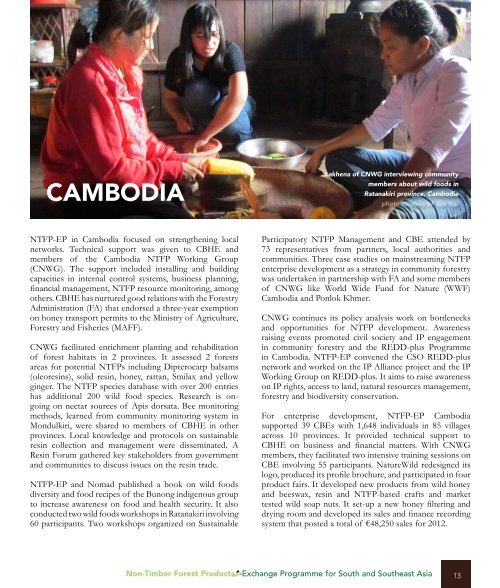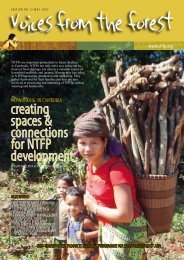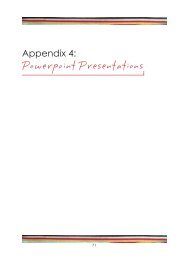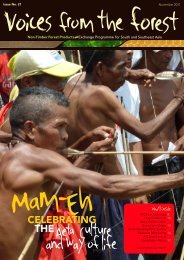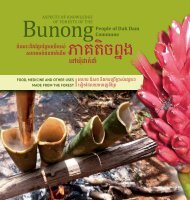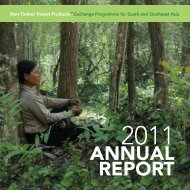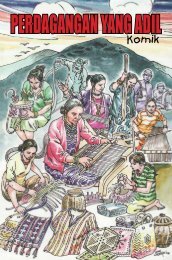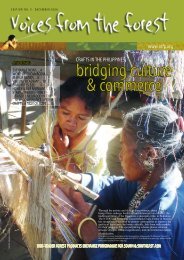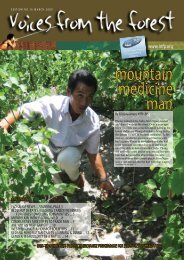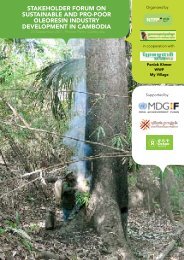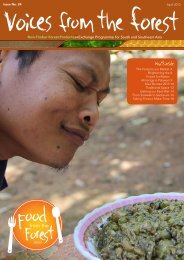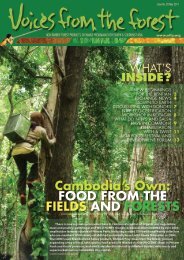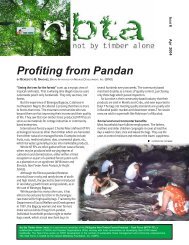annual report - Non-Timber Forest Products Exchange Programme
annual report - Non-Timber Forest Products Exchange Programme
annual report - Non-Timber Forest Products Exchange Programme
You also want an ePaper? Increase the reach of your titles
YUMPU automatically turns print PDFs into web optimized ePapers that Google loves.
CAMBODIALakhena of CNWG interviewing communitymembers about wild foods inRatanakiri province, Cambodiaphoto courtesy of Lav YepNTFP-EP in Cambodia focused on strengthening localnetworks. Technical support was given to CBHE andmembers of the Cambodia NTFP Working Group(CNWG). The support included installing and buildingcapacities in internal control systems, business planning,financial management, NTFP resource monitoring, amongothers. CBHE has nurtured good relations with the <strong>Forest</strong>ryAdministration (FA) that endorsed a three-year exemptionon honey transport permits to the Ministry of Agriculture,<strong>Forest</strong>ry and Fisheries (MAFF).CNWG facilitated enrichment planting and rehabilitationof forest habitats in 2 provinces. It assessed 2 forestsareas for potential NTFPs including Dipterocarp balsams(oleoresins), solid resin, honey, rattan, Smilax and yellowginger. The NTFP species database with over 200 entrieshas additional 200 wild food species. Research is ongoingon nectar sources of Apis dorsata. Bee monitoringmethods, learned from community monitoring system inMondulkiri, were shared to members of CBHE in otherprovinces. Local knowledge and protocols on sustainableresin collection and management were disseminated. AResin Forum gathered key stakeholders from governmentand communities to discuss issues on the resin trade.NTFP-EP and Nomad published a book on wild foodsdiversity and food recipes of the Bunong indigenous groupto increase awareness on food and health security. It alsoconducted two wild foods workshops in Ratanakiri involving60 participants. Two workshops organized on SustainableParticipatory NTFP Management and CBE attended by73 representatives from partners, local authorities andcommunities. Three case studies on mainstreaming NTFPenterprise development as a strategy in community forestrywas undertaken in partnership with FA and some membersof CNWG like World Wide Fund for Nature (WWF)Cambodia and Ponlok Khmer.CNWG continues its policy analysis work on bottlenecksand opportunities for NTFP development. Awarenessraising events promoted civil society and IP engagementin community forestry and the REDD-plus <strong>Programme</strong>in Cambodia. NTFP-EP convened the CSO REDD-plusnetwork and worked on the IP Alliance project and the IPWorking Group on REDD-plus. It aims to raise awarenesson IP rights, access to land, natural resources management,forestry and biodiversity conservation.For enterprise development, NTFP-EP Cambodiasupported 39 CBEs with 1,648 individuals in 85 villagesacross 10 provinces. It provided technical support toCBHE on business and financial matters. With CNWGmembers, they facilitated two intensive training sessions onCBE involving 55 participants. NatureWild redesigned itslogo, produced its profile brochure, and participated in fourproduct fairs. It developed new products from wild honeyand beeswax, resin and NTFP-based crafts and markettested wild soap nuts. It set-up a new honey filtering anddrying room and developed its sales and finance recordingsystem that posted a total of €48,250 sales for 2012.13


